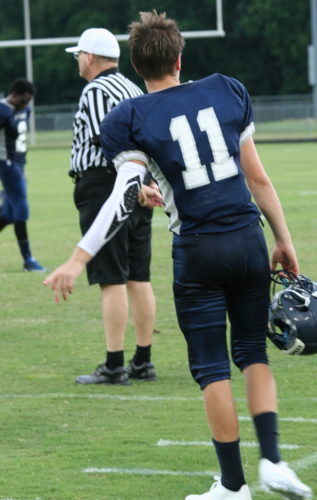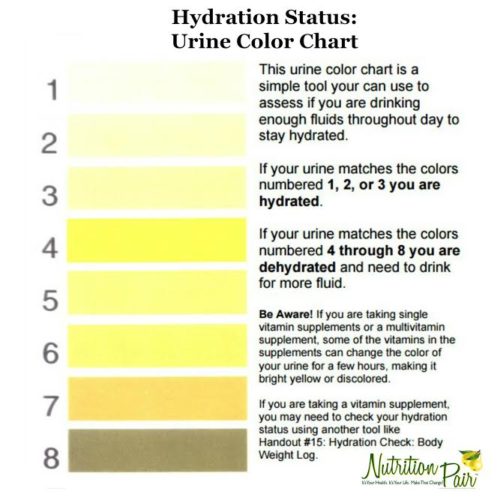 To maximize your youth athlete’s performance in the classroom AND on the field, it is important to pay attention to the foods we eat. Proper fueling and nutrition can help them feel better, be more alert and learn more. During competition, adequate nutrition can help your child athlete stay injury free or recover quicker if injured. Good nutrition does not have an off-season. To get the most benefit, you need to start now and continue throughout the year. Remember, you set the example for your family!
To maximize your youth athlete’s performance in the classroom AND on the field, it is important to pay attention to the foods we eat. Proper fueling and nutrition can help them feel better, be more alert and learn more. During competition, adequate nutrition can help your child athlete stay injury free or recover quicker if injured. Good nutrition does not have an off-season. To get the most benefit, you need to start now and continue throughout the year. Remember, you set the example for your family!
Ahhhh….our favorite time of year—fall sports! We have compiled information that we use for our own children who are active in sports as well as in our work with schools and youth sports teams. For these talks, we have brought in “urine specimen” cups for the athletes to view how their urine looks when they are well and not-so-well hydrated. The kids go nuts when John tries to drink the “specimens”, but it does help them to remember this easy way for them to gage their own hydration status
The Nutrition Playbook:
1.Start each day with Breakfast!
Any food can count towards breakfast. Be sure to include fruit, grains, proteins and dairy.
2. Focus on powerhouse foods:
- Fresh or Frozen Fruits and Vegetables: give your body the energy and nutrients you need to stay active, focused and healthy
- Aim for 2 pieces of fresh fruit and 1-2 cups of Vegetables everyday. Fruit juices are a source of liquid and nutrients but more benefit comes from eating the whole fruit.
- Lean Sources of Protein: provide the nutrients needed to help build new muscle and repair damaged tissues. Baking, grilling, broiling boiling or steaming are great ways to prepare meats. Lean choices include:
- Fresh or frozen Fish, Canned Tuna or Salmon
- Skinless Chicken Breast
- Eggs
- Peanut Butter
- 1%, 2% or Part Skim Cheese
- Whole Grains, breads and cereals: are great source of vitamins, minerals and fiber. They provide a strong source of Carbohydrates, the body’s preferred fuel source! Sources include:
- Oatmeal, Grits or Whole Wheat Cold Cereals
- Whole Wheat Breads, English Muffins, Tortillas
- Wheat Pasta, Brown Rice
3.Drink 8 oz. of 1% or Fat Free Milk or Eat Yogurt at least twice everyday!
- Milk supplies protein and carbohydrate and is an excellent source of calcium, potassium and many other important nutrients!
4. Plan on adding snacks during the day to fit around practices and games
- Snack Ideas: [Good to use as pre or post game snack!]
- Peanut Butter Crackers, graham crackers or sandwich with a Banana and Glass of Milk
- Cup of Yogurt, piece of fruit, and pretzels with water
- Cup of Yogurt with granola cereal
- 3 Fig Newton’s with a glass of water or milk
- Cheese and crackers, grapes, and water
- Homemade Trail Mix:
- Handful of nuts (any type will work) mixed with a ½ handful of dried fruit (raisins, cranberries, apricots, etc.)
- Celery and or Apple with peanut butter
- Cereal and low fat milk. Add some fruit!
5. Limit Fast Foods! While convenience and price makes eating fast food desirable, most restaurant meals short change you in fruits and vegetables. In addition, they often contain excessive amounts of sodium. If you choose fast foods, make sure to add fresh fruit to the meal. Choose Low Fat (1%) or Fat Free (Skim) milk in place of sodas or tea.
6.Stay hydrated during the day by drinking plenty of fluids.
You should be urinating at least every 2-3 hours. Sports drinks may help some, but your first choice should be water. You can monitor urine color to get a better idea of how well hydrated you are. Try to keep urine color between the numbers 1 and 3. (See chart below)
7. Rest and Recovery! Games and practices can make it difficult to keep a regular sleep pattern. It is important to get proper rest to help reduce risk of injuries and provide for time to recover from training. Get a jump on nutrition by planning meals and snacks in advance to help when time becomes limited.

It’s Your Health. It’s Your Life. Make That Change!
Leave a Reply